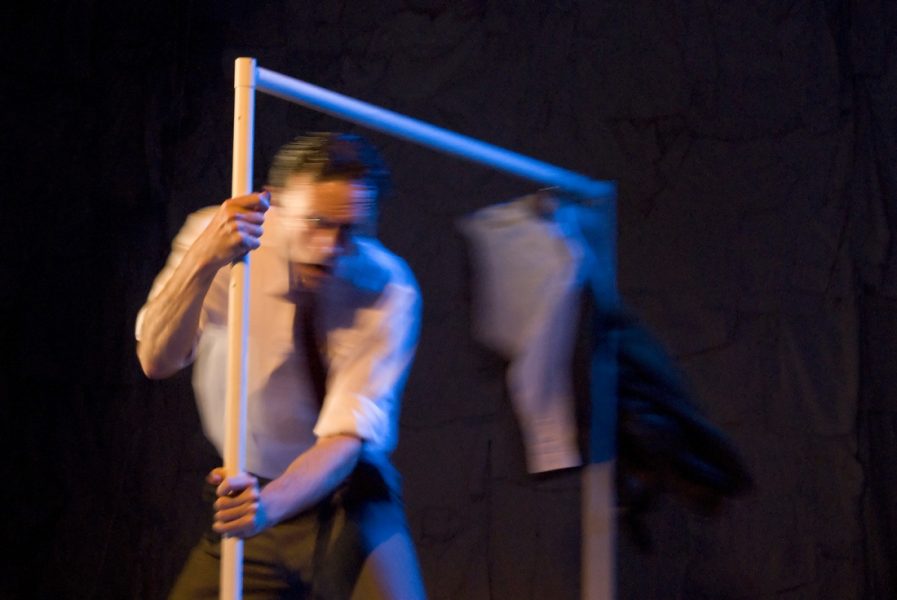@ Traverse Theatre, Edinburgh, until Thu 11 Feb 2016 (and touring)
The metaphor of the circle is a prominent theme in Dogstar Theatre’s The Tailor of Inverness, the one-man show garnering audiences and awards around the world. Written and performed by Scottish-born Matthew Zajac as a way of exploring and honouring his father Mateusz Zajac’s experiences as a Polish soldier in World War II, we learn what happens (in Zajac Senior’s words), “When you are a tailor, and they send you to be a soldier”. Mateusz ultimately settled in Inverness in a seemingly innocuous life, and Zajac presents this period to us at the play’s opening in the character of his father. Mateusz is thus introduced as a pleasant and personable man, speaking in a Scots-Polish hybrid brogue that perfectly underlines the cultural identity questions at the heart of the play.
At first, the only nod to the metaphor are the circuitous routes through Europe which might or might not have been taken by Mateusz following his conscription, and which are helpfully drawn on a projected map, allowing us to get a handle on the proximity of the countries in question. Further, darker, undercurrents then begin to swirl as anecdotes end with a casual reference to death, or a woman’s sad demise.
The story itself then starts to circle, revealing layers like an onion, but never providing a definitive ending, for such a thing is not possible. From time to time in the cycle of the play, we are reminded of Mateusz’s profession – a device that provides a human touch that is more relatable than the wider picture of war. It is hard for the mind to grasp that 20% of Poland’s pre-war population (about 6 million people) was killed by 1945, but about twenty minutes into the play, the enthralled audience is subjected to a brilliant and harrowing pair of stage props that hit home like a punch to the gut: two pint-sized white shirts on miniature coat hangers. The moment is silent, in fact it possibly doesn’t appear in the script at all, though it’s often hard to tell where Zajac’s passionate writing and performance end and Ben Harrison’s equally sensitive direction begins. Add to these the masterful touch of Ali Maclaurin’s haunting set and costume design, effective lighting, and a sprinkling of music, song and dance (Scottish and Polish both), and the resultant production is a cultural melting pot with each aspect a harmonious complement to the whole.
Less seamless is the rather sudden switch in tone near the end of the play when Zajac removes his glasses and speaks to the audience as himself, rather than his father. This ruptures the fourth wall and the story-world spell of the theatre is slightly compromised, but this transition does allow an extra level of introspection in both Zajac and his audience as to the nature of identity. In fact, we begin to suspect that the play stems more from a need for the author to reaffirm his own, which is offset nicely by his father’s seeming desire to obfuscate his. Ultimately, Mateusz’ insistent claiming of the label “tailor” smacks of protesting too much: whether he was a victim, a soldier, a lothario, or a small-town businessman, these labels can no more encapsulate one man’s identity than the appendage “of Inverness” provides the full story of his cultural and geographical roots.
Ultimately, though, the point is not about any one person’s individual identity, but human beings’ collective identity as migrants. As Harrison states in the programme notes, “The play confirms the power of embracing the simple human fact that, in a multicultural society, everyone comes from somewhere else.” The nature of cultural identity is therefore circular – or, at least, open-ended and ever re-defined.
Near the end, the circle metaphor is given explicitly and repeatedly, with reference to wolves circling their prey, tightening the circle until he is caught. Evidently, this image represents Mateusz’ personal flight from danger, but also the son’s need to “capture” the essence of the father – and there is a sense that he might have come closer than the tailor might have liked. Closer, too, than he himself might wish, upon discovering certain aspects of and contradictions in his father’s story that make it harder to cling to the sanctity of this personal piligrimage. This is what gives the play its much-needed edge, and provides the real element of pathos that connects the audience emotionally with Zajac’s real tears at the curtain call.
